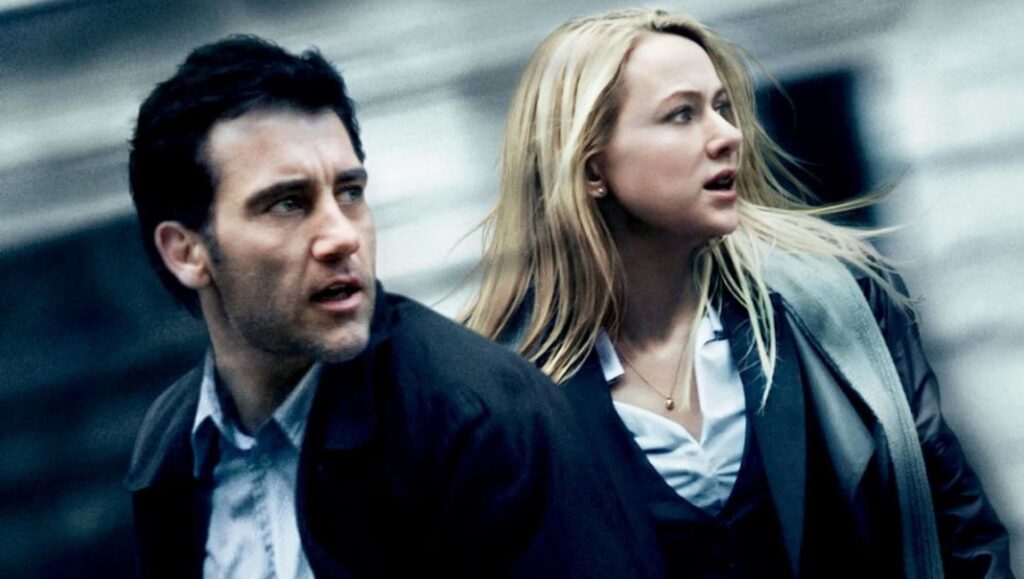The International, the new thriller from director Tom Tykwer, could have been dismissed as an easy knee-jerk reaction to our current economic crisis, but the film was conceived before Lehman Brothers collapsed and Iceland’s National Bank went under. As such, it’s merely an uneven, mostly involving, but nearly incomprehensible movie that strives for consuming paranoia, and achieves it, but doesn’t hone in on its specific narrative concerns. Still, Tykwer’s intentions seem genuine, and the motivation of his protagonist (though hard to pin down) remains basically on target — outrage aimed at corporate greed and corruption is very easy to sympathize with — so perhaps the director’s indictment of capitalism carries some validity. That, or maybe it’s just the one explosive and impeccably staged action set-piece that elevates The International beyond the level of a mediocre action-thriller — just slightly — and stands in defense of the other 108 minutes or so of its runtime.
The plot centers around Louis Sallinger (Clive Owen), an Interpol investigator whose partner is seen being assassinated at the start of the film by order of the International Bank — an institution here depicted as being only a couple notches up from mad scientist villainy. Sallinger only trusts (for reasons not entirely clear) Manhattan District Attorney Eleanor Whitman (Naomi Watts), who acts as Scully to Sallinger’s Mulder, and always looks for the logical answer first, though she can be convinced of anything her conspiracy theorist friend jabbers on about. Watts hasn’t been choosing the most meaty roles lately (not since 2001’s Mulholland Dr., unless you count her performance as the unfortunate housewife tortured in Michael Haneke’s lecturing Funny Games last year). Still, there’s something to be said of the actress’s consistently unfussy performances; here she doesn’t attempt to put into the character (who’s underwritten and largely superfluous) more than asked. This isn’t a memorable performance by any stretch, but it is at least one that doesn’t distract or call too much attention to itself; she isn’t a histrionic actress like, say, Rachel Weisz for instance.
The same could basically be said about Clive Owen, though the actor is probably not as talented as his co-star. In fact, it’s becoming increasingly obvious, based on Owen’s lamentable sameness as of late, that the actor may have better taste than he is talented — recent projects Owen’s worked on were helmed by such internationally acclaimed filmmakers as Spike Lee, Alfonso Cuaron, Mike Nichols, and Mike Hodges. In any case, both Owen and Watts are easily outclassed by the great Armin Mueller-Stahl, who the latter also worked with on David Cronenberg’s Eastern Promises. Like the other two principals, the motive of Mueller-Stahl’s character isn’t entirely clear, but the actor plays his part with such earnestness and restraint that none of that really matters. He’s the guy tasked with imparting to our hero that there’s no way he can hope to dismantle the network of conspirators and liars that exists all around him, but the way in which Mueller-Stahl acts his big scene is noteworthy: with great subtlety, mining an undercurrent of melancholy that other actors probably wouldn’t have found. He’s not as strong here as he was in Promises or a handful of other films, but he does give this movie a much needed jolt of humanity and composure which helps enliven it, especially in the otherwise anti-climactic final act.
But the real star here isn’t any actor, or even Tykwer, who made a name for himself almost exactly a decade ago with his stylish adrenaline shot of a breakthrough film, Run Lola Run, and proved he had serious talent later on with 2002’s excellent Heaven, even if he kind of squandered that good will in 2007, with his clunky literary adaptation Perfume. Instead, the selling point of The International, at least from this vantage, is the jaw-dropping extended action sequence; a shoot-out set in New York City’s Guggenheim Museum. It’s the kind of scene that could actually make this movie memorable; it would have been almost instantly forgotten without it. Impressive staging and meticulous attention to detail, coupled with the blunt trauma of watching such recognizable architecture be decimated, make for one of the most striking action sequences in years, easily surpassing anything in Martin Scorsese’s The Departed. Tykwer acknowledges this sequence’s importance, adorning the film’s promotional artwork with white, curving stripes, suggesting the cyclical structure of the hall in the Guggenheim. The question is: Can one scene make a movie? And, in this case, since The International is such a milquetoast thriller — free of egregious errors, but also woefully lacking in memorable moments — the inclination is to say yes; one scene (and what a scene it is) seems just enough to elevate the film above mediocrity. Again though, just slightly.


Comments are closed.